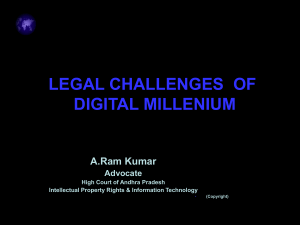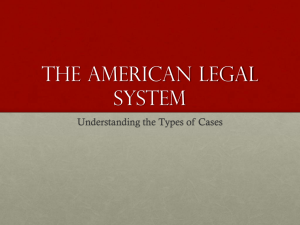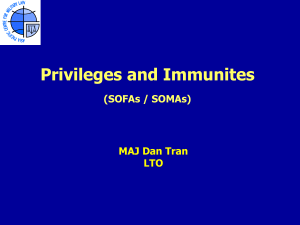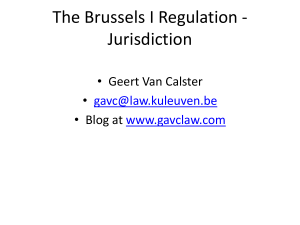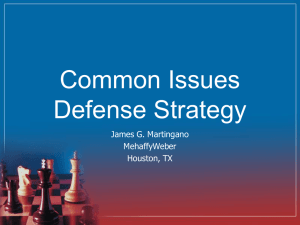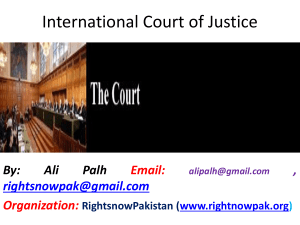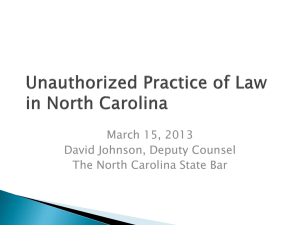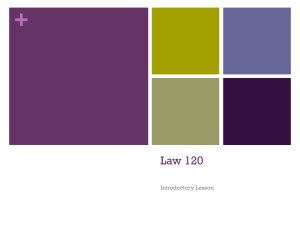Slajd 1
advertisement
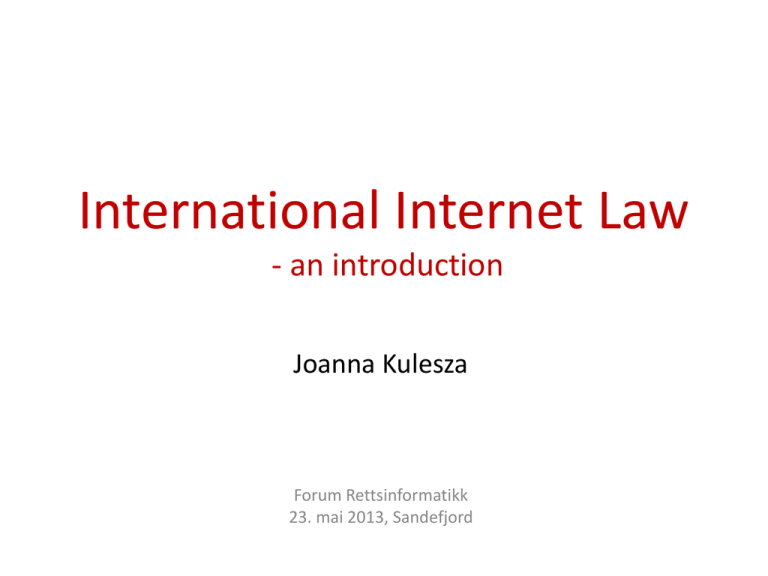
International Internet Law - an introduction Joanna Kulesza Forum Rettsinformatikk 23. mai 2013, Sandefjord scope What laws govern online disputes? the jurisdictional challenge Where do you initiate legal proceedings? the practical challenge What are the things to consider? international Internet law – an introduction J. Kulesza, International Internet Law 2 What laws govern online disputes? the jurisdictional challenge state jurisdiction may be exercised above all: • within state territory • where state competence is complete and exclusive J. Kulesza, International Internet Law 4 state jurisdiction outside own territory may be exercised within: • territories of other states • common territories - so-called international spaces (open sea, Antarctic, outer space) always under authority of international law J. Kulesza, International Internet Law 5 exterritorial jurisdiction exercising state jurisdiction outside state territory may lead to conflicts of jurisdiction principles for eliminating such conflicts are needed J. Kulesza, International Internet Law 6 exercising jurisdiction basic set of jurisdictional principles 1. territoriality principle (territorial jurisdiction) 2. effects principle (effective jurisdiction) 3. personality principle (personal jurisdiction) 4. protective principle (protective jurisdiction) 5. universality principle (universal jurisdiction) J. Kulesza, International Internet Law 7 territoriality principle territorial jurisdiction J. Kulesza, International Internet Law 8 territoriality principle territorial jurisdiction If a person, property or event is located within state borders, state is authorised to exercise its power over them subjective territorial jurisdiction • basic principle • justifies all legislative state activity • any limitations thereof must come from international law J. Kulesza, International Internet Law 9 territorial jurisdiction in cyberspace? subjective territorial jurisdiction • regulating the actions of state residents J. Kulesza, International Internet Law 10 J. Kulesza, International Internet Law 11 12 www.news.com.au effects principle effective jurisdiction J. Kulesza, International Internet Law 13 effects principle effective jurisdiction objective territoriality principle • applicable to events taking place outside state territory if they cause or are aimed at causing serious damage within the state territory • events taking place outside state territory are subject to its legislation • exercised primarly in transborder criminal cases (e.g. murder taking place over state border) J. Kulesza, International Internet Law 14 effective jurisdiction in cyberspace? objective territorial jurisdiction • brings complete legal insecurity • actions taken in cyberspace cause directs results in each state territory where Internet is accesible • the very fact of enabling certain electronic contents online may not result in applying national legislation to all Internet users J. Kulesza, International Internet Law 15 J. Kulesza, International Internet Law 16 personality principle personal jurisdiction J. Kulesza, International Internet Law 17 personality principle active personal jurisdiction applicable over own nationals abroad (living and temporarily residing) diplomatic aid applying criminal laws against wrongdoers who flee the country • enforced through extradition agreements • requires dual penality J. Kulesza, International Internet Law 18 active personal jurisdiction in cyberspace? • a relatively clear and familiar set of rules for each internet user • enables estimating the risk of undertaking actions on-line • but requires double penality J. Kulesza, International Internet Law 19 personality principle passive personal jurisdiction applicable to events taking place outside state territory resulting in damage to state national • used to be applied rarely (due to diplomatic and moral reasons) • is being exercised forever more extensively (antiterrorist policies) J. Kulesza, International Internet Law 20 passive personal jurisdiction in cyberspace? • often used for Internet related cases • brings legal insecurity • puts Internet users under many national legal systems simultanously J. Kulesza, International Internet Law 21 protective principle protective jurisdiction J. Kulesza, International Internet Law 22 protective principle protective jurisdiction • allows to persecute acts committed abroad by non-state nationals if the state feels threatened by those acts • applies to few categories of offences: o crimes against state security o crimes against state functionality J. Kulesza, International Internet Law 23 protective jurisdiction in cyberspace? • solely effective against new cybercrimes (hacking, cracking, computer sabotage) • requires enhanced international cooperation in criminal matters and functioning extradition treaties • requires defining cybercrimes and cyberterrorism J. Kulesza, International Internet Law 24 universality principle universal jurisdiction J. Kulesza, International Internet Law 25 universality principle universal jurisdiction state is entitled to create legislation penalizing certain categories of acts regarded by the international community as so damaging they should be persecuted by all its members • a perpetrator is persecuted regardless of the location where they commited: o o o o o marine time piracy slave trading attacks and kidnappings of air and sea ships genocide and war crimes some terrorist acts J. Kulesza, International Internet Law 26 universal jurisdiction in cyberspace? • doesn’t require further cooperation among states • may be legitimatelly used to combat crimes againts the international community • usually only incitement to universal crimes may be committed on-line J. Kulesza, International Internet Law 27 Convention on the Prevention and Punishment of the Crime of Genocide Adopted by Resolution 260 (III) A of the United Nations General Assembly on 9 December 1948. Article 2 In the present Convention, genocide means any of the following acts committed with intent to destroy, in whole or in part, a national, ethnical, racial or religious group, as such: (a) Killing members of the group; (b) Causing serious bodily or mental harm to members of the group; (c) Deliberately inflicting on the group conditions of life calculated to bring about its physical destruction in whole or in part; (d) Imposing measures intended to prevent births within the group; (e) Forcibly transferring children of the group to another group. Article 3 The following acts shall be punishable: (c) direct and public incitement to commit genocide; J. Kulesza, International Internet Law 28 universal jurisdiction? incitement to genocide? J. Kulesza, International Internet Law 29 J. Kulesza, International Internet Law 30 Where do you initiate legal proceedings? the practical challenge J. Kulesza, International Internet Law 31 the jurisdictional puzzle J. Kulesza, International Internet Law 32 the treaties J. Kulesza, International Internet Law 33 Jurisdiction in cyberspace? existent sequence of jurisdictional principles is not satisfactory How to set the limits of state power in cyberspace? interpreting existing legal norms? setting new mechanisms for cooperation, specific for online activities? J. Kulesza, International Internet Law 34 Jurisdiction in cyberspace? • an international concensus is required to set the sequence of legal priciples applicable to electronic communications until then? • interpretation of existing laws • cyber law vs. real law do we need Internet law? J. Kulesza, International Internet Law 35 cyber law vs. real law 36 © J. Kurbalija, Introduction to Internet Governance What are the things to consider? international Internet law – an introduction J. Kulesza, International Internet Law 37 international Internet law narrow approach legal regulation behind Internet back-bone (DNS, TCP/IP, root-servers, ICANN) o Internet backbone administration model o Internet backbone property model J. Kulesza, International Internet Law 38 © telegeography.com 39 international Internet law general approach legal framework for Internet Governance “the joint development and application by Governments, the private sector and civil society, in their respective roles, of shared principles, norms, rules, decision-making procedures, and programmes that shape the evolution and use of the Internet.” Report of the Working Group on Internet Governance (2005), pt. 10, p. 4. J. Kulesza, International Internet Law 40 From IG to IIL The body of work of UN delegate organizations together with previous achievements of other international fora (CoE, IETF, ICANN) allow to identify the basic principles of the international IG regime This set of rules together with the organizational framework behind them allows to assert that what once was solely a facet of international relations is now becoming a new area of international law with a clear set of principles, own terminology and discussion fora. J. Kulesza, International Internet Law 41 International Internet Law (IIL ) is developed by: • international organizations • national governments acting through international law instruments, but also by the • business and civil society members in a new multi-stakeholder process A new formula for shaping international law is in the making M.S. McDougal questions the actual distinction between law and policy U. Fastenrath finds soft law crucial to exercising any political impact J. Kulesza, International Internet Law 42 On general rules and principles Law of the horse? "the best way to learn the law applicable to specialized endeavors is to study general rules. Lots of cases deal with sales of horses; others deal with people kicked by horses; stIIL more deal with the licensing and racing of horses, or with the care veterinarians give to horses, or with prizes at horse shows. Any effort to collect these strands into a course on 'The Law of the Horse' is doomed to be shallow and to miss unifying principles.” F. H. Easterbrook (1996) J. Kulesza, International Internet Law 43 IIL principles I. Multistakeholderism II. Cultural diversity III. Freedom of access IV. Openness V. Network security J. Kulesza, International Internet Law 44 Future of IIL Future of IIL • international cooperation of all stakeholders is predominant to the existence and further evolution of IIL • elaboration of IIL content is taking place in multiple international fora future of IIL reflects the evolution of public international law: • a universal hard-law framework for cyberspace seems to be the background for recent CoE, EU, ITU or ICANN activities J. Kulesza, International Internet Law 46 Internet Framework Convention an Internet Framework Convention would have to: 1) incorporate the IIL principles described above 2) tackle all the key issues of electronic communications 3) propose a unique multilateral and multi-stakeholder regime based on a wide contractual consensus acceptable to national authorities, international organisations, industry representatives and civil society J. Kulesza, International Internet Law 47 Internet Framework Convention for the consensus to be binding, the Convention would have to foresee at least two interrelated responsibility/liability mechanisms the rules for private law entities (from industry or civil society sectors) would have to differ from traditional international law schemes applicable to states might be based on the current trends in IT industry endorsing self-regulatory privacy protection, using peer pressure and consumer choice, rather than traditional contractual liability J. Kulesza, International Internet Law 48 Internet Framework Convention • particular solutions for each issue tackled within the Convention might be further developed within its Additional Protocols • Additional Protocols could derive richly from international law: environmental law, human rights regime, law of the sea J. Kulesza, International Internet Law 49 Thank you joannakulesza@gmail.com graphics: ©istock unless indicated otherwise
